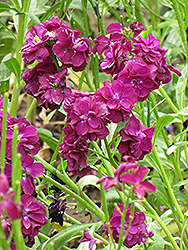make life beautiful
Plant Database
This is your garden planning resource.
Height: 30 inches
Spacing: 14 inches
Sunlight:
![]()
![]()
Hardiness Zone: 6b
Other Names: Brompton Stock
Description:
A biennial or tender perennial producing tall spikes of highly fragrant flowers in late spring; blooms range from pink, purple, red, white, lavender, and yellow; plants tend to decline under mid-summer temperatures; a popular cut flower
Ornamental Features
Stock features showy spikes of fragrant pink flowers with purple overtones rising above the foliage from late spring to early summer. The flowers are excellent for cutting. Its tomentose oval leaves remain grayish green in color throughout the season.
Landscape Attributes
Stock is an herbaceous biennial with an upright spreading habit of growth. Its medium texture blends into the garden, but can always be balanced by a couple of finer or coarser plants for an effective composition.
This is a relatively low maintenance plant, and is best cleaned up in early spring before it resumes active growth for the season. It is a good choice for attracting bees and butterflies to your yard, but is not particularly attractive to deer who tend to leave it alone in favor of tastier treats. It has no significant negative characteristics.
Stock is recommended for the following landscape applications;
- Accent
- Mass Planting
- Border Edging
- General Garden Use
- Container Planting
Planting & Growing
Stock will grow to be about 24 inches tall at maturity, with a spread of 18 inches. When grown in masses or used as a bedding plant, individual plants should be spaced approximately 14 inches apart. It grows at a fast rate, and tends to be biennial, meaning that it puts on vegetative growth the first year, flowers the second, and then dies.
This plant does best in full sun to partial shade. It prefers to grow in average to moist conditions, and shouldn't be allowed to dry out. It is not particular as to soil type or pH. It is somewhat tolerant of urban pollution. This species is not originally from North America.
Stock is a fine choice for the garden, but it is also a good selection for planting in outdoor pots and containers. With its upright habit of growth, it is best suited for use as a 'thriller' in the 'spiller-thriller-filler' container combination; plant it near the center of the pot, surrounded by smaller plants and those that spill over the edges. It is even sizeable enough that it can be grown alone in a suitable container. Note that when growing plants in outdoor containers and baskets, they may require more frequent waterings than they would in the yard or garden. Be aware that in our climate, this plant may be too tender to survive the winter if left outdoors in a container. Contact our experts for more information on how to protect it over the winter months.
A NetPS Plant Finder tool
